While the Adams administration has been issuing shelter deadlines to adult immigrants for months, and to some families with kids in hotels as part of a separate initiative, Tuesday’s evictions were the first to apply to families with children under City Hall’s broader policy, which officials say is an effort to manage more than 168,500 new arrivals since 2022—69,000 of whom remain in the city’s care.
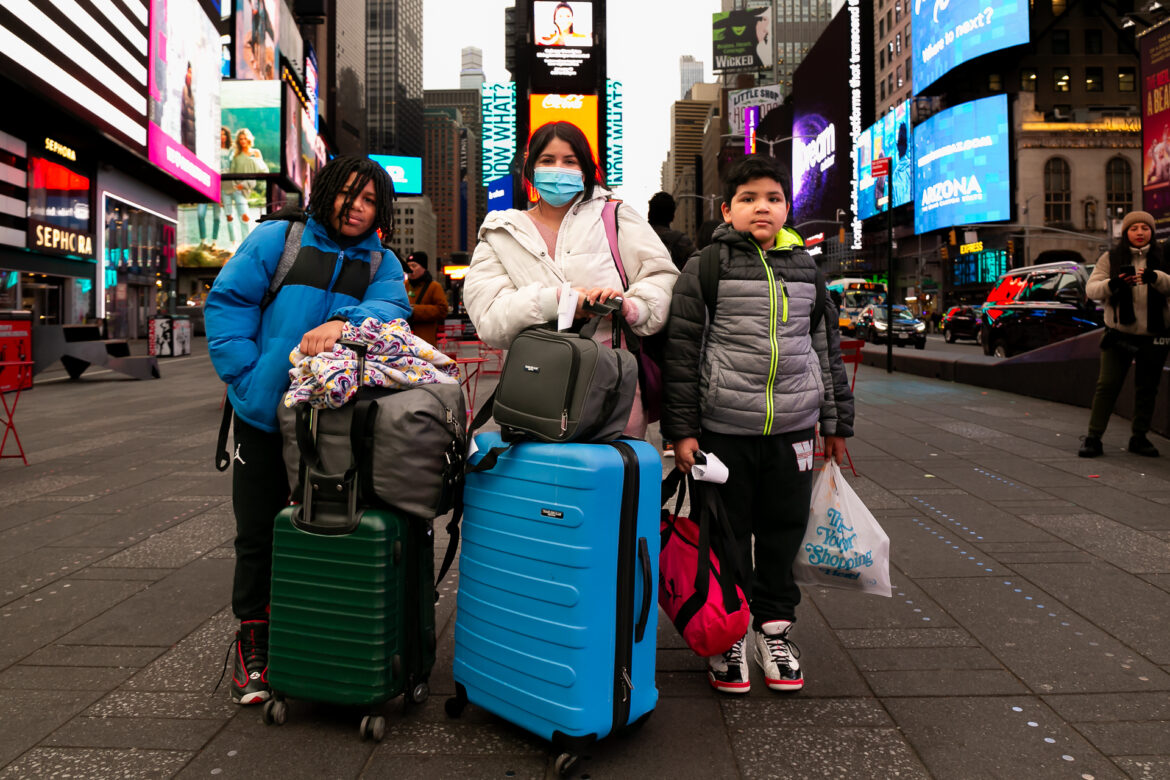
Adi Talwar
Elizabeth Leon with her two sons, ages 12 and 9, carrying their belongings to the city’s intake center at the Roosevelt Hotel to reapply for shelter on Tuesday.Lea la versión en español aquí
Elizabeth Leon was supposed to have a doctor’s appointment Tuesday.
At five months pregnant, she’d expected to find out the sex of her baby that day. Instead, she spent hours waiting in line for another shelter bed placement: on Jan. 9, she and 40 other immigrant families were evicted from rooms at Manhattan’s Row Hotel, part of a policy aimed at freeing up space in New York City’s overwhelmed homeless shelter system.
While the Adams administration has been issuing shelter deadlines to adult immigrants for months, and to some families with kids in hotels as part of a separate initiative,* Tuesday’s evictions were the first to apply to families with children under City Hall’s broader policy, which officials say is an effort to manage more than 168,500 new arrivals since 2022—69,000 of whom remain in the city’s care.
“We had two hours to pack everything and go,” Leon told a reporter in Spanish of departing the Row, where she and her two children, ages 9 and 12, had been staying since they arrived from Venezuela eight months ago. “We didn’t have enough suitcases to hold everything so we had to throw a lot of stuff out. We kept clothes and only what was necessary. We left the rest behind.”
The city has so far issued more than 47,000 eviction notices to adult immigrants in shelter, and another 4,800 to families with children. City officials say the limits are intended to both help new arrivals get “stabilized” and move them more quickly out of the crowded shelter network, which now spans 216 emergency sites and 18 Humanitarian Emergency Response and Relief Centers (HERRCs), including two large tent complexes. Caring for new arrivals will cost the city billions, the administration says.
“We’re running out of space, we’re running out of personnel and we certainly are running out of funds, and so we really have to move from an emergency to managing this in the way that makes sense,” Anne Williams‑Isom, deputy mayor for health and human services, said at a press briefing Monday, where officials repeated calls for additional federal aid.
According to City Hall, roughly 26,800 immigrants have seen their notices expire, less than a quarter of whom are still in the city’s care. “What we are trying to do is actually stabilize them, make sure they have what they need and make sure that those families that are just coming to us at the front door also have an opportunity,” Williams‑Isom said.
But the administration’s policies have drawn significant backlash. Dozens of city and state lawmakers sent a letter last month imploring Mayor Eric Adams to nix the evictions policy, calling it “cruel” and citing concerns over how frequent shelter moves will impact children’s schooling.
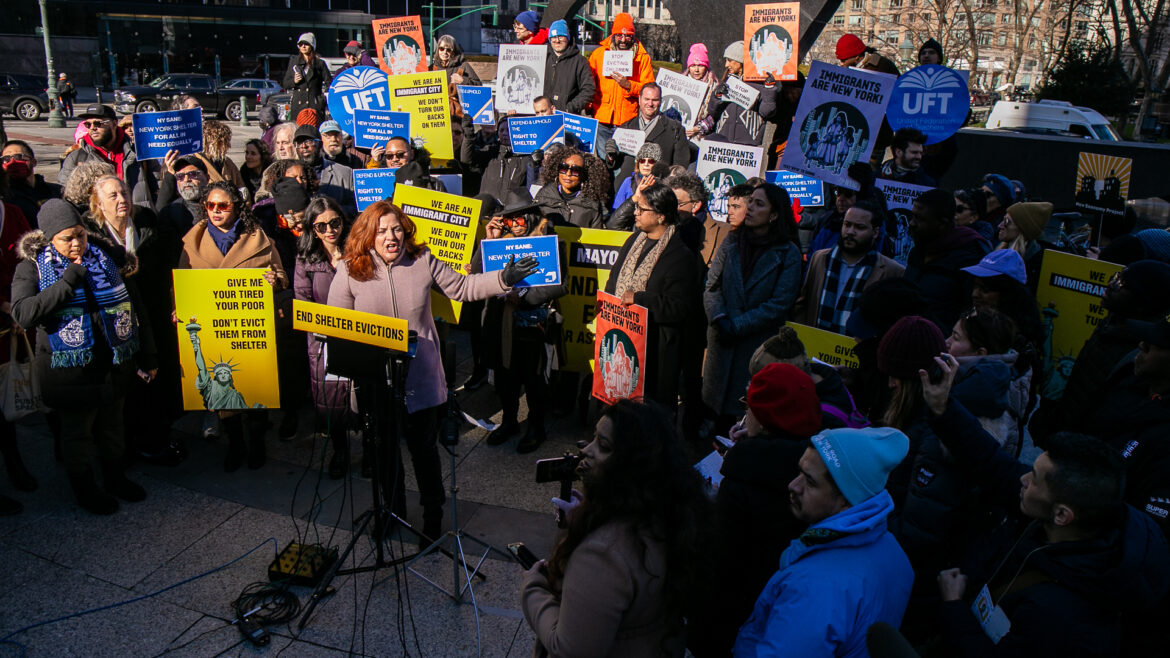
Adi Talwar
WIN CEO Christine Quinn at a rally in Foley Square Monday denouncing the city’s shelter limits, which she characterized as “ripping children out of their beds.”On Tuesday, City Comptroller Brad Lander said his office will be investigating City Hall’s implementation of the 30 and 60-day limits, including what information is provided to recipients, how the administration is tracking outcomes and the costs of administering the policy.
While immigrants who receive the deadlines can re-apply for another placement in the system at the end of their stays, that process has become increasingly fraught in recent weeks. At a city-run “reticketing center” in the East Village, where people can apply for either tickets out of town or a shot at another shelter bed, hundreds of adults have lined up for hours each day in frigid temperatures for a place to stay.
“Let’s be perfectly clear—the 60-day rule is one thing and one thing only: harassment,” former NYC Council Speaker Christine Quinn, who now works for family shelter provider WIN, said at a rally against the evictions Monday.
“There is no leadership coming out of City Hall,” she added. “So in their effort to reduce the number of folks who need housing they think ripping children out of their beds will make these families leave and go back to their countries of origin. That will not happen.”
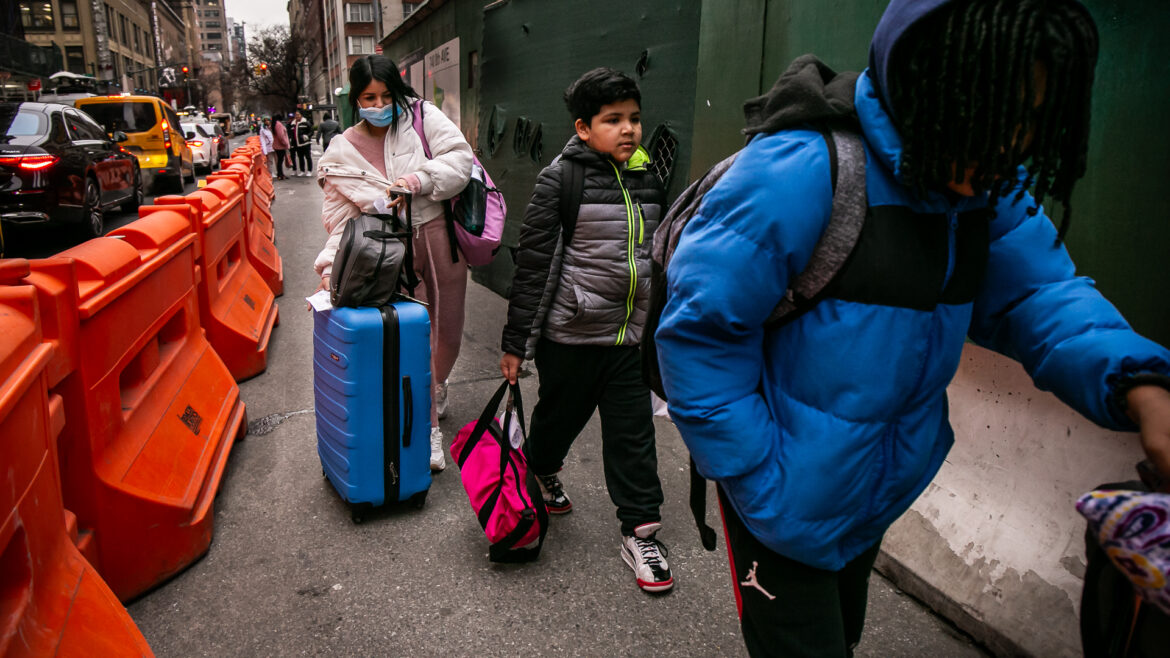
Adi Talwar
Elizabeth Leon, who is five months pregnant, walking across town with her sons to reapply for shelter placement.‘My kids are sad and scared’
The day before the first wave of families with children saw their shelter deadlines expire, City Hall officials said they’d be prioritizing them for another placement in the system, aiming specifically to re-assign families with school-aged kids “preferably in a hotel near to where the children are currently in school,” said Dr. Ted Long, senior vice president with NYC Health + Hospitals, one of the agency’s coordinating the city’s response.
For Leon, who skipped her prenatal doctor’s appointment and kept her two children home from school on Tuesday, it meant waiting nearly 10 hours at the Roosevelt Hotel, the city’s main intake center for newly arrived immigrants. That morning, the family lugged their belongings in bags and suitcases through Times Square for the roughly 15 minute walk from one hotel to the other.
“My kids are sad and scared because they don’t know where we are going,” she told a reporter in Spanish as they made the trek. “I am scared because I am not sure if we will end up sleeping on chairs tonight.”
The trio arrived at the Roosevelt around 10:30 a.m. They didn’t leave until after 8 p.m., during an ongoing rainstorm, after receiving a new shelter placement downtown.
“They didn’t help us with transportation. They just gave us the address of where we should go and that’s it,” she said, but added that the family was treated well when they arrived at their new shelter site, located in the Financial District. Her children attend schools in Brooklyn and on the Upper West Side.
Critics of the mayor’s 60-day policy for families say it’s especially harmful for those with school-aged children like hers. Despite promises from City Hall that students’ education won’t be impacted, and federal law requiring the city bus unhoused students between their schools and assigned shelters, “it almost never works,” City Comptroller Lander said at a press conference Tuesday denouncing the moves.
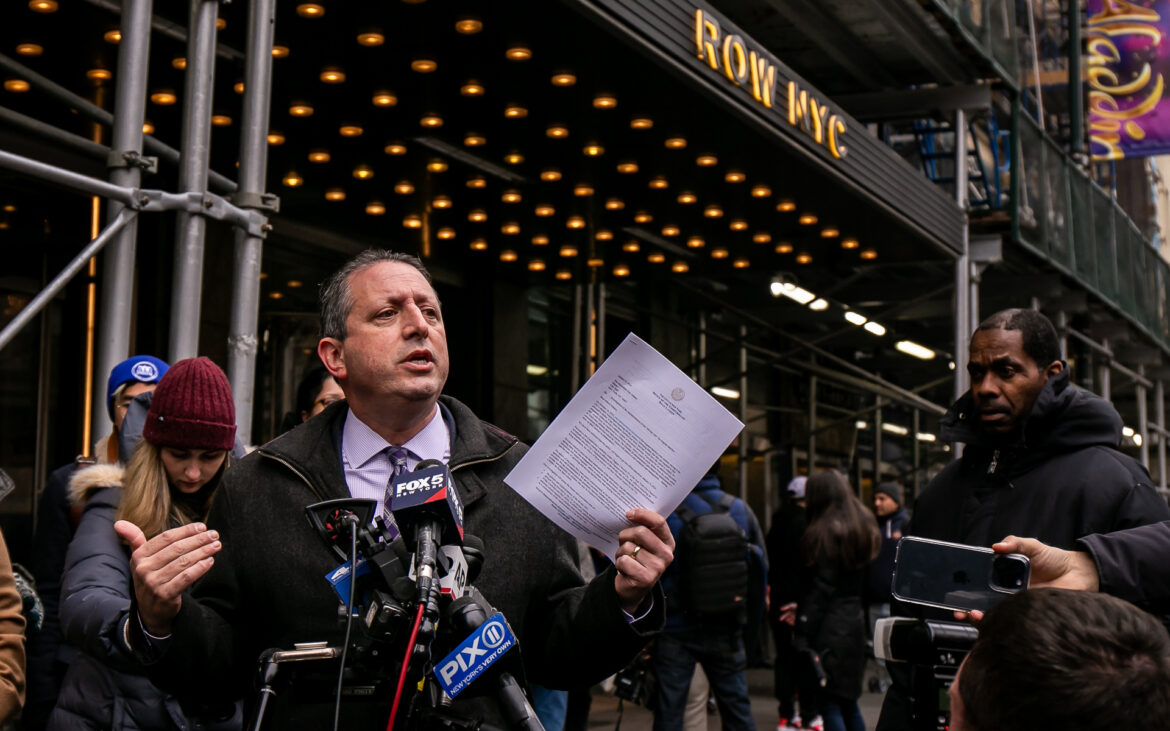
Adi Talwar
City Comptroller Brad Lander addressing the press in front of the Row Hotel in Manhattan, where he announced his office would be investigating the city’s 60-day shelter policy for immigrant families with kids.“You guys know how bad, unfortunately, the busing system is,” Lander told press gathered outside the Row. “I find it very hard to believe, given that the city has almost never succeeded in making sure kids can stay in their same schools when they transfer shelters, that they will be able to do that.”
Naveed Hasan, a parent of two and a member of NYC’s Panel for Education Policy, said the upheavals every two months have wider implications for school communities.
“It’s not just going to affect those kids, right? The classroom that they’re in will get new students, most likely, who are in the close-by shelters, and to have the teacher do this every 60 days is going to create an environment where no one will learn anything all year,” he told a City Limits reporter.
“To have them carry that stuff around with them without any help between hotels is unconscionable. And the kids are stressed out because the parents are completely freaked out,” Hasan added. “And that sort of emotional state of the whole family permeates the classroom environment, and it’s not a good thing.”
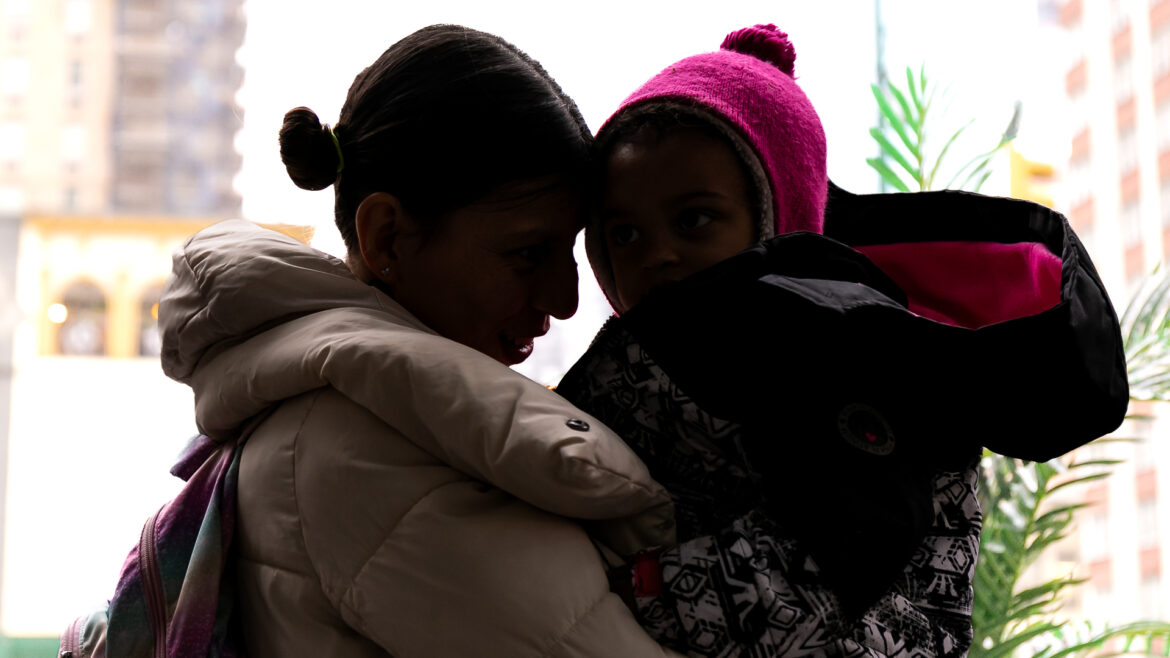
Adi Talwar
Katherin Burbano, 28, with her 2-year-old daughter. The family has a deadline to leave their hotel shelter in late January.‘Where am I going to go?’
María, 26, who asked that City Limits withhold her full name, was also evicted from the Row on Tuesday. Early in the morning, a supervisor had come to her and her husband’s room, where they’d been staying since August, to check how many items were left in the soon-to-be vacated space. María said she was told she would have 60 days to continue checking her mail at the hotel—a vital resource for shelter residents with ongoing immigration proceedings.
She headed to the Roosevelt early to get in line for another placement, hoping to be out before a scheduled 2 p.m. doctor’s check-up for her 35-week pregnancy. But like Leon, María missed her appointment; around 6:40 pm, after waiting eight hours, she was placed in a shelter in Brooklyn.
At the press conference the day before the family’s exit, officials stressed that all families with expiring deadlines had received extra case management to help plan their next steps.
“On average, each adult from each household has had more than four meetings with our exit planning team where we go over, ‘Do you have friends and family in New York City or somewhere else? Can we call your sister in Queens or your brother in Chicago?” Mayor Eric Adams explained.
But María said she was only asked those questions when she first entered shelter five months ago. “There are a lot of people who don’t have family here in the U.S.,” she said. “That was one of the questions they asked when we came here, but I don’t have any family. So where am I going to go?”
Other families are bracing for shelter deadlines in the coming weeks. Katherin Burbano,* originally from Colombia, is staying at the Row Hotel with her two year old daughter, who she said has been diagnosed with heart murmurs. Initially scheduled to leave the hotel Tuesday, they were given 14 more days after Burbano asked for an extension.
Still, the looming expiration date has filled her with “incredible fear.”
“I feel defeated,” Burbano told a reporter in Spanish. “I haven’t slept well, I have been so worried for my daughter.”
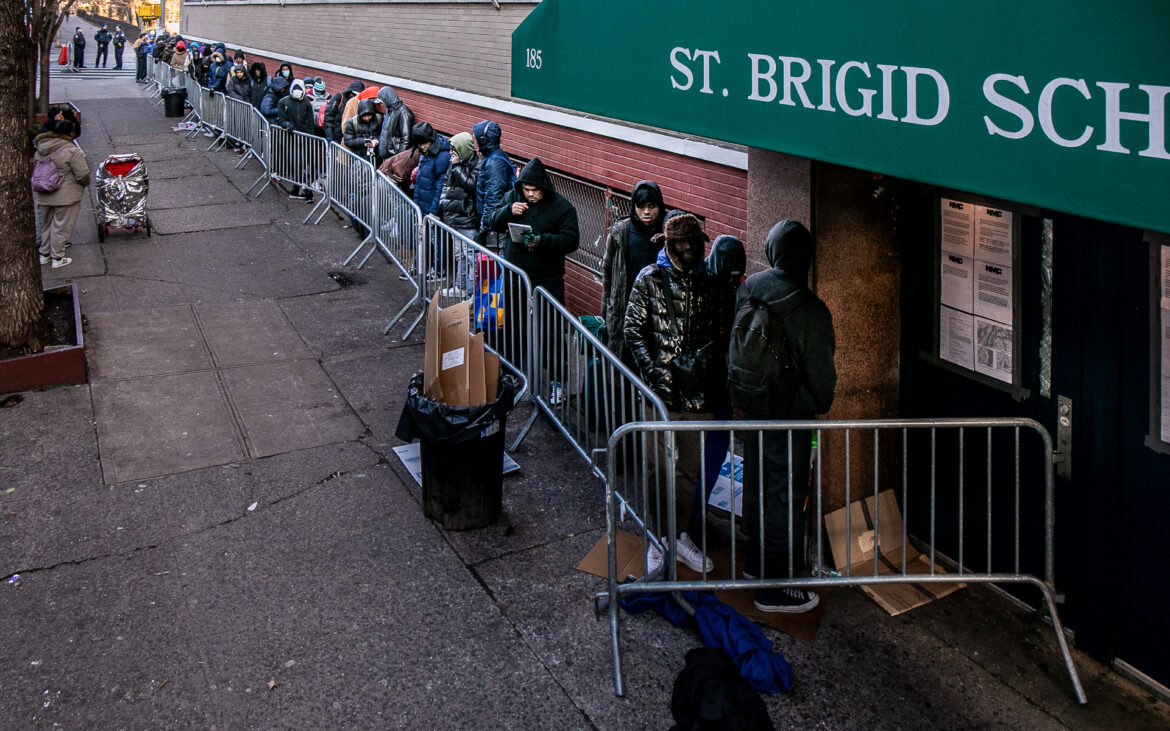
Adi Talwar
About 340 people waiting in a line that snaked around the block at St. Brigid School in the East Village, the city’s “reticketing center” for adult immigrants in shelter.
Meanwhile, recently-arrived immigrants without children, who have been subject to shelter evictions since the summer, are waiting days on end to acquire a new shelter bed. As of Monday, the average wait time was about seven days, according to City Hall.
Shortly after 9 a.m. that day, roughly 350 men stood in line outside of 185 East 7th St. in the East Village, formerly the St. Brigid School, many wearing wristbands numbered in the thousands. One man, who arrived from Senegal in October, carried small cambros along the sidewalk, selling coffee for one dollar a cup.
The building by Tompkins Square Park has been operating since Oct. 21 as a “Reticketing Center,” run by the Office of Emergency Management (OEM). Although immigrants can acquire tickets there to leave the city—more than 1,400 have so far—a mayoral spokesperson said that more often people are requesting a new shelter bed.
Bundled up with jackets and blankets, several men described a tiring routine of standing in line all day and spending their nights in churches, sometimes catching sleep on the floor, or in a chair. To accommodate those without shelter placements, the city is now operating five of these so-called waiting areas, where about 900 people stay each night.
According to City Hall, people receive a number when they check in at St. Brigid to re-apply for shelter, and do not need to physically stand in line.
“Anyone choosing to continue to wait in line is choosing to do so on their own, but they have been made aware that it will not impact their holding place,” a spokesperson said. “Additionally, we have opened several holding areas for migrants to wait when St. Brigid is not open.”
But several men told City Limits that they had no other choice but to wait outside, as the overnight locations make them leave early in the morning.
Thierno Barry arrived in New York City from Guinea on Oct. 19, and was able to stay in city shelters until late December. He joined the line at St. Brigid at 5 a.m. on Monday. According to Barry, he had been without shelter for 12 days. His wristband was labeled with the number 8,698.
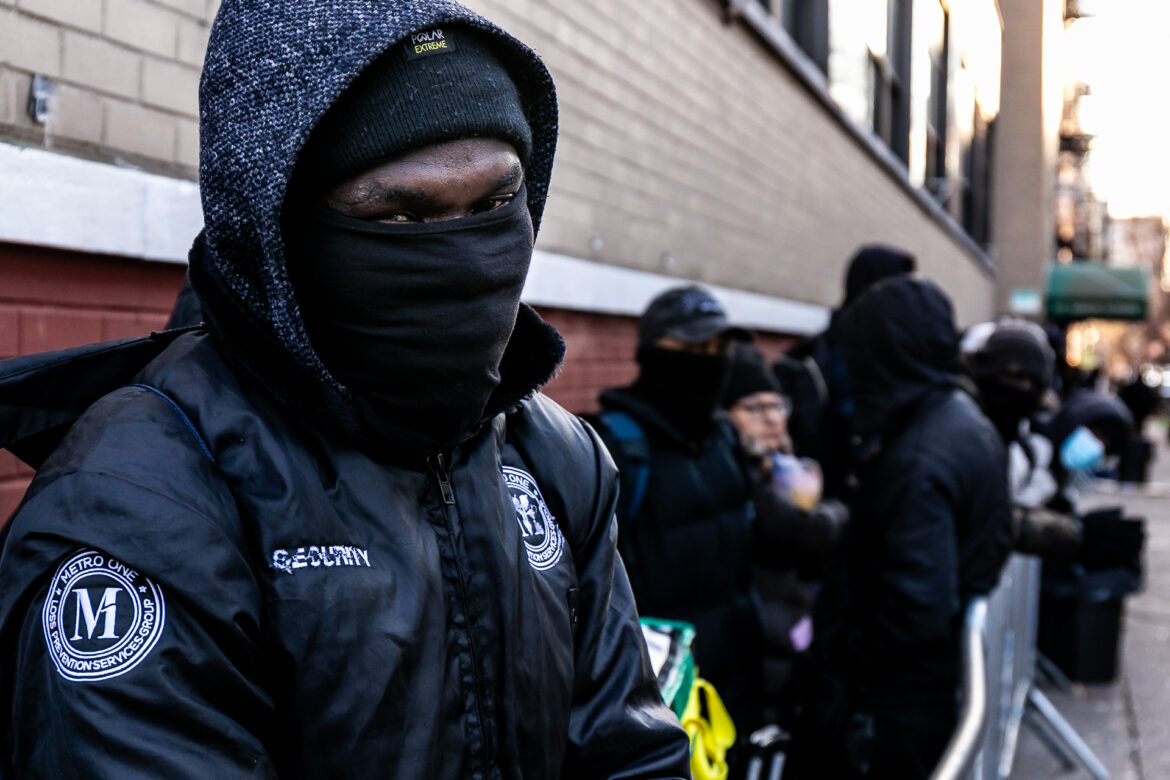
Adi Talwar
Amadou Djigo, from Senegal, bundled up against the cold to wait in line for a shelter bed Monday. He had been in NYC for about 45 days, and was last in a shelter on Dec 22, 2023.“We wait in line here because there’s nowhere to go,” he said in French. “At night, they give us metro cards to go sleep in the church. The church opens at 8. The next day, at 6 a.m., they tell us we need to leave. So we come here to wait.”
Amadou Dhigo, from Senegal, described the discomfort of spending the night in churches—jerking his head to demonstrate how it feels to nod off. “You can’t sleep, because you’re sitting,” he said in French.
In a statement, City Hall said the shelter system is “long past its breaking point” and the city is “simply out of space and resources to continue to shelter tens of thousands of migrants indefinitely as thousands more continue to enter our care every single week.”
Meanwhile, the Legal Aid Society acknowledged that the situation at St. Brigid is a blatant violation of the city’s right to shelter, which for decades guaranteed a bed to anyone in need, at least temporarily. The organization is currently in court-ordered mediation with city and state officials over those protections, which the Adams administration has sought to roll back, citing the influx of new arrivals.
“The court is aware of what’s going on, and the state really needs to come through with more support to help the city there, otherwise I think we’re going to have some liability,” said Josh Goldfein of Legal Aid. “Everything is on the table.”
Based on his own experience being kicked out of a shelter in December, Barry, from Senegal, said the routine would not be appropriate for families with children.
“That’s terrible. It pains me,” he said. “Because we are adults, we suffer here, but to see children out here in the streets, that’s something else. I don’t accept that. I hope the government finds another strategy to house them.”
To reach the editor, contact Jeanmarie@citylimits.org.
*This story has been updated since original publication to include a reference to earlier shelter deadlines the Adams administration issued to certain families with kids in hotels, who were subject to 28-day stays. We also corrected a typo in Burbano’s last name; City Limits regrets the error.








